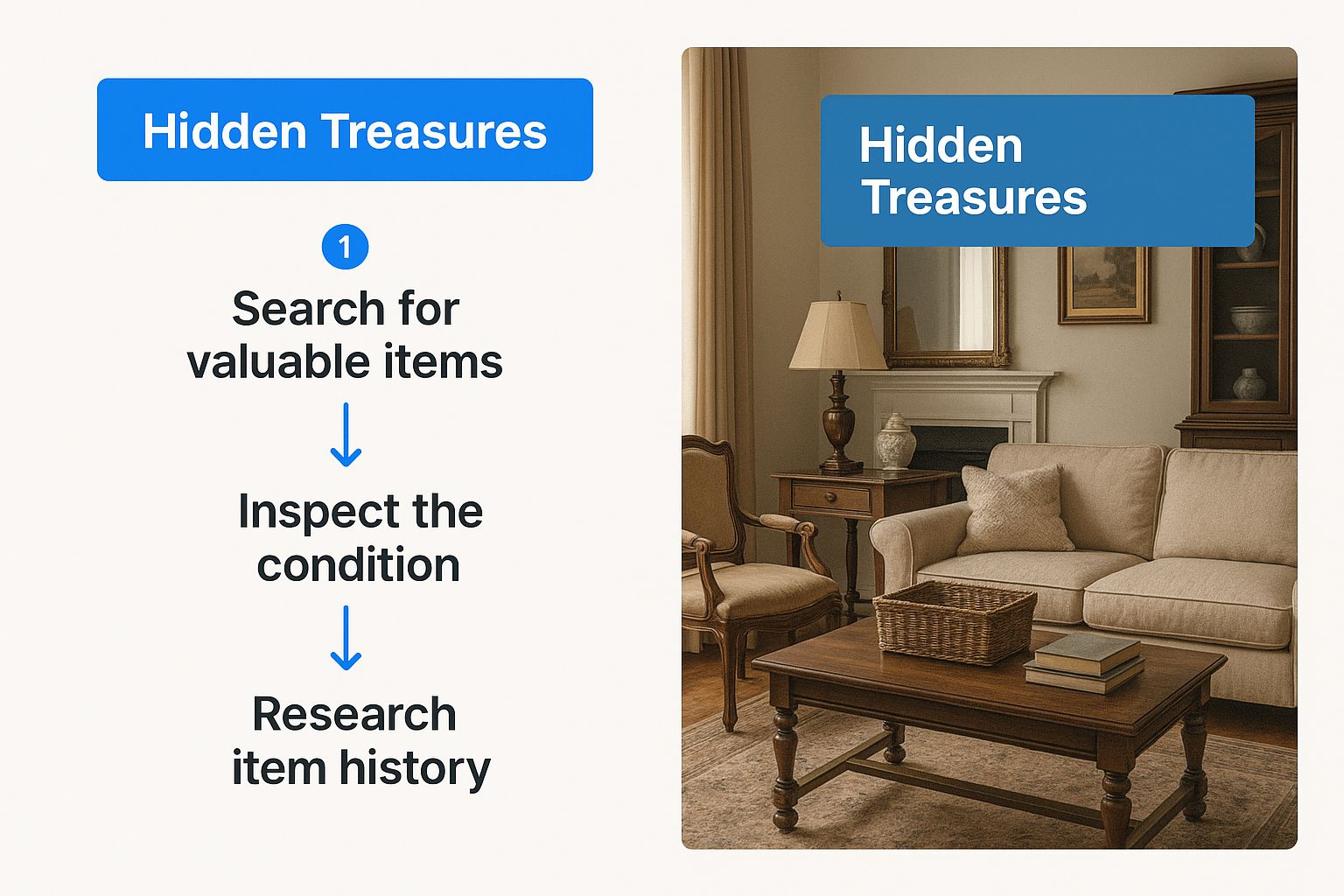Are Estate Sales Worth It? A Complete Guide

For most people staring down a house full of possessions, the answer is a resounding yes—a professional estate sale is absolutely worth it. The real value isn't just in the final check; it's in trading a commission for an enormous savings in time, sweat, and stress, all while getting the best possible financial return.
The Bottom Line on Estate Sales
Think of it like hiring a general contractor for a major home renovation. You could try to manage all the plumbers, electricians, and painters yourself, but the project is far more likely to succeed (and stay on budget) with an expert in charge.
When you're dealing with an inheritance or a major downsize, the sheer volume of "stuff" can feel completely overwhelming. A professional company steps in to handle every last detail—from digging through attics and pricing antiques to staging the home, marketing the sale, and managing the final clean-out. They turn a mountain of work into a streamlined, manageable process.
Of course, it’s not a one-size-fits-all solution. The key is to weigh the commission against the often-overlooked benefits: your own time, energy, and sanity.
An estate sale company's commission is an investment in expertise, efficiency, and peace of mind. They have a vested interest in getting the highest prices possible, which often leads to a better net profit than you could achieve on your own.
So, how do you know if it's the right move for your situation? Let's break it down.
Decision Matrix When an Estate Sale Is Your Best Bet
Use this table to quickly see if a professional estate sale aligns with your goals and circumstances.
| Factor | An Estate Sale Is Worth It When... | You Should Consider Alternatives If... |
|---|---|---|
| Inventory Volume | You have a full house of items to liquidate. | You only have a handful of high-value items or a small quantity of goods. |
| Your Time & Energy | You have limited time, live out of state, or find the process too emotionally draining. | You have ample free time and the physical and emotional energy to manage a DIY sale. |
| Item Value | The estate contains a solid mix of valuable antiques, collectibles, and quality household goods. | The majority of items have low resale value or are in poor condition. |
Ultimately, if the "Worth It" column sounds like your situation, a professionally managed sale is likely your best path forward. It's the most effective way to liquidate an entire household's contents efficiently and profitably.
Understanding How an Estate Sale Actually Works
So, what really goes on behind the scenes at an estate sale? First, let's get one thing straight: this is a world away from your typical garage sale. Think of it less like a weekend clear-out and more like a professionally managed pop-up retail event, all taking place inside a home. It's a comprehensive service designed to sell just about everything, making the process smooth for you while aiming for the best possible financial outcome.
It all kicks off with a consultation. An estate sale professional will walk through the home to get a feel for the contents, judging if there's enough value and volume to make a full-scale sale worthwhile. If it gets the green light, their team jumps into action. They meticulously sort through, organize, and artfully stage every single item, from the fine china in the cabinet to the tools in the garage.
This is where their expertise really shines. They know how to spot the hidden gems you might have walked past a hundred times.

They have a knack for turning a lived-in house into an inviting shopping space, pricing everything from everyday kitchenware to valuable antiques at fair market value.
From Staging to Sale Day
With the home staged and ready, the marketing machine kicks in. The company photographs the most appealing items and blasts the sale out to their network of followers—think antique dealers, collectors, and seasoned estate sale shoppers—along with the general public. This professional promotion is a huge part of what you're paying for and is critical for drawing a big crowd.
An estate sale isn’t just about selling items; it’s a full-service project. Professionals manage the appraisal, staging, marketing, sales event, and final clean-out, turning a potentially overwhelming task into a hands-off process for the client.
The sale itself usually runs for a weekend, maybe two or three days. A full staff is on hand to manage the flow of people, handle payments, and keep an eye on everything. They’re there to answer questions and sell everything from the living room sofa to the last piece of costume jewelry.
And it doesn't end when the last customer leaves. After the sale, the company handles all the leftovers. This often means arranging for donations or a bulk buyout for the remaining items. The final step is a "broom-swept" clean-out, leaving the property empty and ready for its next chapter. Only then is the job done, and you receive the net proceeds from the sale.
Breaking Down the Costs and Potential Profits

To really answer the question, "are estate sales worth it?" you have to look at the numbers. The great thing about a professional sale is that its financial structure is designed to be a win-win, since it runs on a commission-based model. This setup means the company’s earnings are directly tied to how well they sell your items.
That shared goal is a powerful motivator. It ensures the company is working hard to secure the highest possible prices for everything, from that antique armoire in the corner to the everyday kitchenware in the drawers. Their interests are perfectly aligned with yours.
Understanding the Financials
The industry standard commission for an estate sale company usually falls somewhere between 30% and 50% of the total gross sales. For most situations, a rate around 35% is pretty common. While that might sound high at first glance, remember what it covers: professional appraisal, staging, marketing, staffing the event, and the final clean-out. It’s a lot of work.
Let’s put that into perspective with some real-world figures. A few years back, data showed the average estate sale brought in about $18,565 in gross revenue. After a 35% commission, the estate’s net return would be just under $12,000. That's a significant sum—and often much more than what a DIY effort could bring in on its own.
The commission fee isn't just a cost; it’s an investment in specialized expertise. A professional team’s ability to price items at fair market value and attract motivated buyers almost always results in a higher net profit for the estate.
Additional Costs to Consider
While the commission is the main expense, some situations might require extra fees. Don’t worry—these are always discussed upfront and detailed in your contract, so there are no surprises.
Depending on the state of the estate, you might see add-on costs for things like:
- Trash Hauling: For homes with a lot of debris or unsellable items that need to be cleared out.
- Specialized Appraisals: If the estate includes rare art, coins, or jewelry that needs a certified expert’s eye.
- Deep Cleaning Services: Sometimes a property needs more than a standard "broom-swept" clean-out.
- Extra Advertising: For promoting unique, high-value collections to niche buyers beyond the company's standard marketing.
Even with these potential additions, the net profit from a professionally managed sale almost always makes the investment worthwhile. For a deeper dive into how these fees work, check out our guide on understanding estate sale commission rates.
What Makes an Estate Sale Worth It?

Figuring out if an estate sale is the right move really boils down to what you have to sell. A successful sale isn't just about having a house full of stuff; it's about having the right stuff in the right amounts to attract serious buyers and make the whole effort worthwhile.
Think of a traditional estate sale company like a concert promoter. They won't book a band unless they know they can sell enough tickets to cover the venue, staff, and marketing, with enough left over for everyone to make a profit. It’s the same logic for an estate sale.
That's why most professional companies have a minimum revenue they need to hit, usually somewhere between $5,000 and $10,000. They know from experience that below a certain point, the sale just won't generate enough income to cover their work and give you a decent return.
The Right Mix of Items and Value
The sheer volume and value of your inventory are what drive profitability. It’s a numbers game. Industry data from 2023 shows that while some sales are massive—with about 8% having over 5,000 items—many successful ones fall into a more common range. In fact, over 23% of sales featured between 1,000 and 1,999 items.
At the same time, companies have gotten pickier. The average minimum revenue they're willing to accept for a sale has climbed to nearly $8,500.
The magic formula is a healthy mix of high-value "anchor" items—think quality furniture, art, or jewelry—and a large volume of desirable everyday goods. The big-ticket items draw the crowds, but all the general household stuff is what really adds up and drives the total sales volume.
But it’s not just about what's inside the house. A few other factors play a huge role in a sale's success.
- Location, Location, Location: A home in an easy-to-find, well-trafficked neighborhood will always get more shoppers than one tucked away in a remote area. Simple as that.
- Local Market Tastes: What’s hot in one city might be a dud in another. Mid-century modern might fly off the shelves in one town, while rustic farmhouse decor is in demand just a few counties over.
- High-Value Collections: Do you have specialized collections of things like rare books, vintage toys, or specific antiques? These can be a massive draw for niche buyers and can seriously boost your final numbers.
Taking an honest look at these factors is the first step. If you need a hand figuring out the best path forward for your unique situation, you can always get personalized estate sale help to weigh your options.
The True Value Beyond the Final Check
When people ask, "are estate sales worth it?" the conversation usually lands on one thing: the final check. But the real value goes so much deeper than the dollar amount, bringing non-monetary benefits that are often priceless during a tough time.
Think about the sheer amount of time and labor involved. A typical estate sale requires hundreds of hours of work—sorting through a lifetime of items, figuring out what thousands of things are worth, and staging a whole house. This isn't a weekend project; it can easily swallow up all your free time for months.
More Than Just Money
Handing this monumental task over to a professional service changes the game. Instead of losing your weekends in a dusty attic, you get that time back to focus on your family or handle other important parts of the transition. The emotional relief of letting go of that burden, especially when dealing with grief, is hard to put a price on.
The real return on investment from an estate sale is often measured in peace of mind. By outsourcing the physical and emotional labor, you are investing in a smoother, less stressful transition for your entire family.
Professionals also bring a trained eye to the table. They can spot valuable items that most of us would write off as junk. That old painting in the hallway or a box of costume jewelry could be a hidden gem, and their expertise ensures you get what it's truly worth. To get a better sense of the numbers, you can explore our guide to the average estate sale proceeds.
When you get right down to it, the commission you pay an estate sale company is an investment in a few key areas:
- Expertise: Using professional know-how to price everything correctly and maximize your return.
- Efficiency: Turning a project that could take months into a process that takes just a few weeks.
- Emotional Support: Removing a huge source of stress and potential family conflict from your plate.
These are the intangible benefits that often make the experience truly worth it.
Common Questions About Estate Sales
Even with a clearer picture of the process, it's natural to have a few questions lingering in the back of your mind. Let's tackle some of the most common concerns people have before they decide an estate sale is right for them.
What Happens to Items That Don't Sell?
This is easily the most frequent worry we hear. No one wants to be left with a house full of leftovers after the sale is over. Fortunately, any professional company worth its salt has a plan for this, and it’s all decided before the sale even starts. The universal goal is to leave the home completely empty, or “broom swept.”
There are a few standard ways this is handled:
- Charitable Donations: Unsold goods are often taken to a pre-approved charity. The best part? You typically get the tax-deductible receipt.
- Bulk Buyouts: Sometimes a single buyer will purchase everything that's left for one lump sum, giving your final profits a nice little boost.
- Clean-Out Services: For anything that can't be sold or donated, a hauling service comes in to clear it all out.
You'll know exactly which route will be taken before you sign a contract, so there are no last-minute surprises once the doors close.
How Do I Find a Reputable Company?
Finding a trustworthy partner is the single most important decision you'll make in this process. A great place to start your search is on well-known industry platforms like EstateSales.net or by looking for members of the American Society of Estate Liquidators (ASEL).
A true professional will be an open book, happy to answer every question you have. Never be shy about asking for their commission rates, proof of insurance, and even a few references from past clients before you agree to anything.
Always, always interview at least two or three companies. A good liquidator will have a professional website, a history of positive online reviews, and a straightforward contract that spells out all their services and fees. Doing this homework upfront ensures you're putting your family's estate in experienced, reliable hands.
Can I Set Minimum Prices or Keep Items?
Absolutely. This is your sale, after all. Before any work begins, you'll do a walkthrough of the home with the company to point out any heirlooms or personal items you want to keep. Those pieces are then removed or clearly marked "Not For Sale."
You can also discuss setting a minimum or "reserve" price on specific high-value items. A word of caution here, though: it's usually best to trust the company's pricing expertise. They live and breathe this market and have a deep understanding of what buyers are actually willing to pay. Overpricing a key item can scare off bidders and leave it unsold, which doesn't help your bottom line. Trusting their strategy is a big part of what you're paying for.